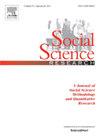Achieved or ascribed? The trajectory of family background and educational assortative mating in China over four decades
IF 3.5
2区 社会学
Q1 SOCIOLOGY
引用次数: 0
Abstract
This study investigates the evolving patterns of assortative mating based on family background and education in China from 1978 to 2022 focusing on the impact of economic inequality. Using data from the 2010–2022 China Family Panel Studies (CFPS) and employing log-linear models, the study examines how family background (ascribed status) and educational attainment (achieved status) influence mate selection. The findings reveal that, the degree of family background homogamy has strengthened with social modernization in China. This shift is closely linked to the rising economic inequality in the context of China, which has increased the emphasis on economic and cultural resources in mate selection. Meanwhile, educational homogamy followed a pattern of initial increase, reflecting the growing importance of education in spousal choice, followed by a decline in recent decades. This decline may be attributed to the devaluation of educational qualifications due to the rapid expansion of higher education. The results support the economic inequality perspective, suggesting that economic inequality has a stronger influence on assortative mating trends than modernization theories. These findings underscore the critical role of family background in shaping marriage patterns, reinforcing the concentration of socioeconomic resources within families and contributing to the perpetuation of social inequality.
成就还是归属?40年来中国家庭背景与教育选择性婚配的轨迹
本文研究了1978年至2022年中国基于家庭背景和教育的分类交配模式的演变,重点研究了经济不平等的影响。使用2010-2022年中国家庭面板研究(CFPS)的数据并采用对数线性模型,研究了家庭背景(归属地位)和教育程度(实现地位)如何影响配偶选择。研究结果表明,随着中国社会的现代化,家庭背景同性婚姻的程度不断增强。这种转变与中国日益加剧的经济不平等密切相关,中国在择偶时越来越重视经济和文化资源。与此同时,受教育程度较高的同性婚姻最初呈上升趋势,这反映出教育在配偶选择中的重要性日益增加,随后在近几十年有所下降。这种下降可能是由于高等教育的快速扩张导致教育资格的贬值。研究结果支持经济不平等的观点,表明经济不平等比现代化理论对分类交配趋势的影响更大。这些发现强调了家庭背景在塑造婚姻模式方面的关键作用,强化了家庭内部社会经济资源的集中,并助长了社会不平等的延续。
本文章由计算机程序翻译,如有差异,请以英文原文为准。
求助全文
约1分钟内获得全文
求助全文
来源期刊

Social Science Research
SOCIOLOGY-
CiteScore
4.30
自引率
4.00%
发文量
0
审稿时长
65 days
期刊介绍:
Social Science Research publishes papers devoted to quantitative social science research and methodology. The journal features articles that illustrate the use of quantitative methods in the empirical solution of substantive problems, and emphasizes those concerned with issues or methods that cut across traditional disciplinary lines. Special attention is given to methods that have been used by only one particular social science discipline, but that may have application to a broader range of areas.
 求助内容:
求助内容: 应助结果提醒方式:
应助结果提醒方式:


